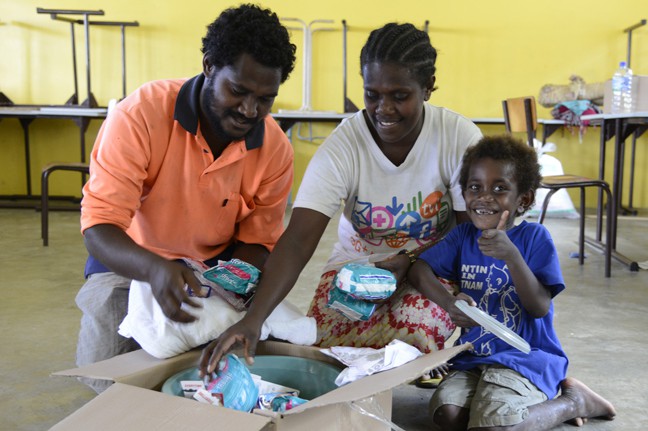人道救援, 大洋洲2015年3月20日
'We have had to use all of our savings to buy food'

Amy Christian
Amy Christian是樂施會瓦努阿圖辦公室的傳播協調員

Hygiene kits are distributed at Lycee Bouganville school which is acting as a temporary evacuation centre.
Photo credit: Amy Christian/OxfamAUS
By Oxfam Communications Coordinator Amy Christian, in Vanuatu
Yesterday I arrived in Vanuatu to join the Oxfam emergency response team as they respond to the aftermath of Cyclone Pam.
As our plane descended into Port Vila, I caught glimpses of the islands that make up Vanuatu between perfectly formed clouds, which looked still, as if in a painting — the blue of the ocean a calm turquoise canvas beneath. The islands themselves looked ravaged, trees torn and broken and houses left without roofs or walls. I found myself imagining how different this view would have been just a week before, on the eve of the biggest cyclone to ever hit the Pacific.
After disembarking our plane, we made our way to a briefing with our colleagues who arrived a few days earlier. The streets of Port Vila were a hive of activity, people were busy at work clearing the debris left behind by Cyclone Pam. Neat piles of fallen branches and bits of tin roofing lay in piles along the roadside; trucks and lorries full-to-the-rafters filled the roads and smoke billowed out across the sky as people burn the waste that can’t be moved. I found myself feeling surprised at how much has been done and how improved things look compared to the photos I saw from just a few days ago.
Today I joined the Oxfam team as they carried out their first distribution — 51 hygiene kits were taken to one of the evacuation centres in Port Vila, Lycee Bouganville, a school taking on a second role in the crisis.
Families greeted us with smiles and thanks and showed me where they’d been sleeping the last week. Gideon, his wife Aileen and their son John, told me they were worried about having to go home as their house had been completely destroyed.
‘It will take me several months to rebuild and repair the damage of the cyclone, as I don’t have the finances to build back quickly. I have no money,’ he said.
‘In our community we don’t have any clean water, we used to use a well but that has been contaminated now. In the next few months my biggest worry is food though. At home our garden is damaged so we won’t have any food available.’
Gideon and his family moved to the evacuation centre as Cyclone Pam bore down on Vanuatu last Friday.
‘When the cyclone happened it sounded like a big whistling sound. I’d never heard anything like it in my life. I was really scared. The walls shook so hard; rain water came inside so we had to move the children up onto the tables.’
Another family sit together outside one of the classrooms cooking lunch— a big bowl of rice and some tinned sardines in tomato juice. Hager Kulmet tells me she is worried about how much money her family hashad to spend on food since arriving last week.
‘We have had to use all of our savings to buy food because we couldn’t bring any with us. It is becoming very difficult.’
Although Hager and her immediate family now live in Port Vila, she is originally from Tanna Island, one of the outer islands hit the worst by Cyclone Pam.
‘We have lots of family in Tanna Island and we are very worried about them now because we heard that Tanna suffered very badly in the cyclone,’ she said. ‘We haven’t heard from them since Friday and we can’t get in touch. We’ve heard that people’s houses have been blown away.’
As someone who has never lived through a cyclone, much less a Category 5 cyclone, it’s very hard to imagine all of worries people like Hager and Gideon now face. I’m humbled today, not just by the capacity of nature to rip apart everything in its wake but by the sheer strength of the human spirit to cope with whatever is thrown at them, to get back up and make plans to start again.
